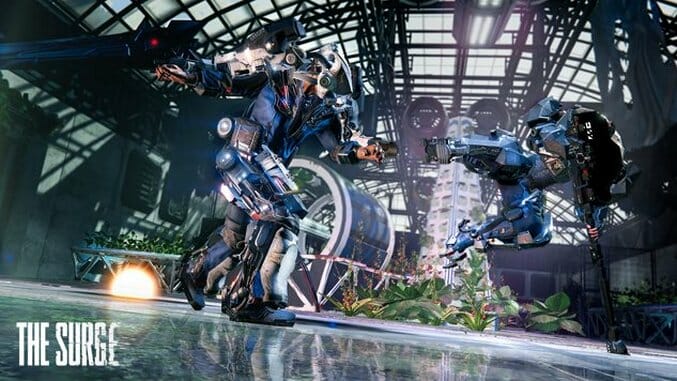The Surge Is a Bland, Hypocritical Mess

While exploring one of The Surge’s several dim, uninteresting factories, we meet a fellow worker, kneeling on the ground and unable to move because his robotic exoskeleton has run out of power. Provided by our mutual employer, the sinister CREO, these mechanical suits supposedly enfranchise us to work harder and achieve more – at the beginning of The Surge our character is confined to a wheelchair, and may only walk thanks to the assistance of his own company-provided machine. But as the game continues, and we battle incessantly against androids, environmental hazards and other CREO employees, it becomes evident the corporation is interested more in our subjugation. Our repeatedly dying and reviving is analogue for social immobility: ostensibly in service to the capitalist institution, often in The Surge we are progressing nowhere. Likewise, killing fellow workers and taking their belongings – armor, weapons, money – is synecdoche for age-old, economic competition. When jobs and opportunities are few, and personal status is synonymous with ownership, people will step over one another to get ahead. This is the world The Surge implies. As we take our loot, insert it into a processor and use it to improve our own exoskeleton, we are almost literally using the blood of workers to support CREO, the company. Like the man in the factory, forced to kneel by the very machine that purportedly empowers him, we are driven to submit to a falsely benevolent system.
The Surge isn’t influenced by Demon’s Souls. It steals from it. And by adherence to various genre tropes (extreme difficulty, diffuse narrative, free-form exploration) the game’s satire is dramatically undercut. One might call it parody. By emulating so completely the Demon’s and Dark Souls games – bleak, obfuscated horrors in which ardour is currency – The Surge more loudly casts its aspersions about materialism and the modern workforce. But although it impresses something about attrition, to die and instantly revive in The Surge betrays exactly the deprecation of human life, at the hands of a dispassionate system, that the game purports to abhor. The amount of time dedicated to literally retreading old ground, the sporadic plot beats and out-of-place contrivances render The Surge too long and too capricious to be called discerning. From its overtly allegorical, nuts-and-bolts world, a fantastical convenience like Demon’s Souls’ fog doors would be better left out. Albeit re-imagined, when they appear, the game seems produced not by original, perceptive provocateurs, but the very opposite – copycats.
Nevertheless, above most games of similar size, The Surge boasts cohesiveness. Determined there is something ugly about both social competition and the acquisition of wealth, it is not satisfied that players simply pick objects up. To collect better weapons, during combat we must specifically select our enemies’ most vulnerable body parts and steadily hack them off – getting what we want is a much more gruesome, and less passive act than pressing a single button. The game’s aesthetic, comprising incredible machines, dystopian landscapes and unfailing interfaces, might threaten its relevance to now. But a couple of flourishes – our protagonist, who wails in pain when it’s installed, seems at first as unfamiliar with the exoskeleton as we are; a sorrowful 20th Century country song plays unendingly on our base camp’s radio – ingratiate The Surge to the present-day. Its sheer length and body count overwhelm its finer points, but the game manages to familiarise its character and his concerns.
 Keep scrolling for more great stories.
Keep scrolling for more great stories.


